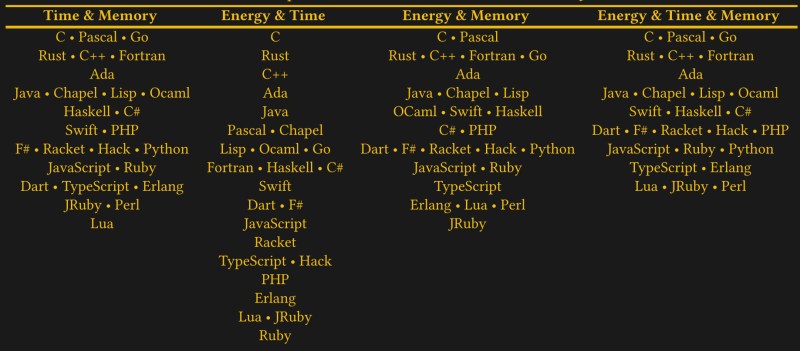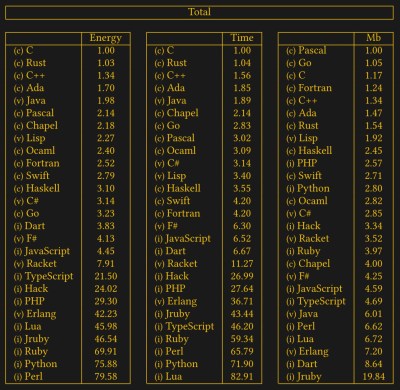C is the Greenest Programming Language

Have you ever wondered if there is a correlation between a computer’s energy consumption and the choice of programming languages? Well, a group Portuguese university researchers did and set out to quantify it. Their 2017 research paper entitled Energy Efficiency across Programming Languages / How Do Energy, Time, and Memory Relate? may have escaped your attention, as it did ours.
Abstract: This paper presents a study of the runtime, memory usage and energy consumption of twenty seven well-known soft- ware languages. We monitor the performance of such lan- guages using ten different programming problems, expressed in each of the languages. Our results show interesting find- ings, such as, slower/faster languages consuming less/more energy, and how memory usage influences energy consump- tion. We show how to use our results to provide software engineers support to decide which language to use when energy efficiency is a concern.
 While we might take issue with some of the programming languages selected as being “well known”, the project was very thorough and quite well documented. Most people would take for granted that a computer program which runs faster will consume less energy. But this might not always be true, as other factors enter into the power consumption equation besides speed. The team used a collection of ten standard algorithms from the Computer Language Benchmarks Game project (formerly known as The Great Computer Language Shootout) as the basis for their evaluations.
While we might take issue with some of the programming languages selected as being “well known”, the project was very thorough and quite well documented. Most people would take for granted that a computer program which runs faster will consume less energy. But this might not always be true, as other factors enter into the power consumption equation besides speed. The team used a collection of ten standard algorithms from the Computer Language Benchmarks Game project (formerly known as The Great Computer Language Shootout) as the basis for their evaluations.
Last year they updated the functional language retults, and all the setups, benchmarks, and collected data can be found here. Check out the paper for more details. Have your choice of programming language ever been influenced by energy consumption?
Post a Comment